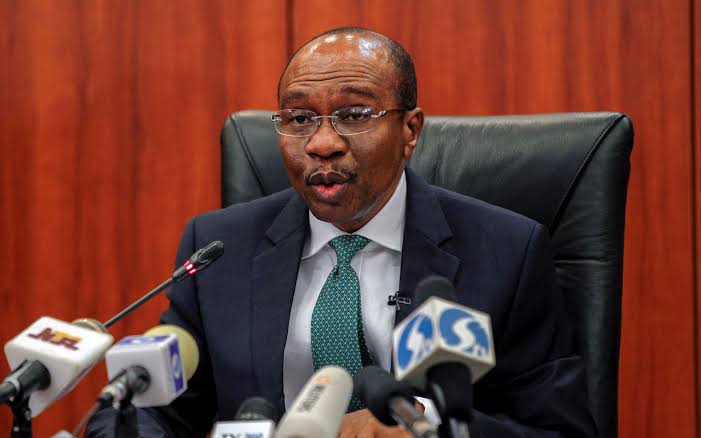The Governor of the Central Bank of Nigeria, Godwin Emefiele, on Thursday, said the Nigerian economy was overdue to go cashless as the Federal Government had sufficiently invested in the required payment system infrastructure to make the transition seamless.
Emefiele said this shortly after meeting the President, Major General Muhammadu Buhari (retd.), at his native hometown of Daura, Katsina State.
Controversies have trailed the CBN’s latest policy which limits daily cash withdrawals to N20, 000 and weekly withdrawals of N100,000 for individuals.
But defending the CBN’s directive, Emefiele said, “I think it’s important for me to say that the cashless policy started in 2012. But on almost three to four occasions, we had to step down the policy because we felt that there is a need for us to prepare ourselves and deepen our payment system infrastructure in Nigeria.
“Between 2012 and 2022, almost about 10 years, we believe that a lot of electronic channels have been put in place that will aid people in conducting banking and financial service transactions in Nigeria.
“And we think Nigeria as the biggest economy in Africa needs to leapfrog into the cashless economy. We cannot continue to allow a situation where over 85 per cent of the cash that is in circulation is outside the bank. More and more countries that are embracing digitisation have gone cashless.”
Responding to the National Assembly’s rebuttal of the policy, Emefiele said the withdrawal limits were not cast in stone but would be reviewed upwards with time.
He argued that the CBN did not wish to make life difficult for Nigerians but only sought to better the economy.
“We will be reviewing from time to time how this is working because I cannot say that we are going to be rigid. But it is not to say that we will reverse, it is not to say that we will change the timing, but whether it is about tweaking some amount to be a little bit higher or a little bit lower, and all the rest of them.”
He added that the CBN would publish the names of all of its 1.4 million super agents to ease the return of old monies in unbanked communities.
On the amount of the old notes that had been returned to vaults, he said, “We have taken more than have a trillion and in the bank we also have close to half a trillion.
Meanwhile, the House of Representatives summoned Emefiele to come and explain the policy to the parliament. He is to appear before the lawmakers on Thursday.
However, the House is considering a joint session with the Senate to grill Emefiele on Tuesday.
The resolutions were based on a motion of urgent public importance moved by a member of the House, Aliyu Magaji, at the plenary on Thursday.
Speaker of the House, Femi Gbajabiamila, noted that it was “a topical issue that everybody is concerned about,” asking the mover of the motion to explain why the policy was bad.
Magaji said, “This issue on which I have moved this motion bothers whoever is sitting in this place because most of them are from rural areas where everything is done in cash. Then, somebody will wake up like they own this country and make a policy that will start tomorrow – no consultation. People have forgotten that 80 to 90 per cent of the people are in rural areas. We must do something to save the situation. If there was enough time, enough banks and enough facilities, why not?”
Most of the lawmakers condemned the policy, with Gbajabiamila noting that he would meet with President of the Senate, Ahmad Lawan, to see if the chambers could have a joint session to grill Emefiele.
The Speaker said, “If we want to comply with the Act, he should be appearing before the whole National Assembly. I think you will allow me to speak to the Senate president and see whether, in compliance with the Act, we can have a joint session. This is important enough for him to brief the National Assembly (jointly).
“If that fails, appearing before the National Assembly actually does not necessarily mean a joint session. If you appear before the Senate and he appears before the House separately, you have appeared before the National Assembly. But at the same time, I will ask if that is possible.”
Tentatively, the House resolved that Emefiele appears in the chamber at 11am on Thursday.
However, a member of the House, Ibrahim Olanrewaju, after the motion to summon Emefiele had been unanimously adopted, raised a point of order, urging the chamber to demand suspension of the policy until the lawmakers concluded their investigation.
Olanrewaju noted that Emefiele’s appearance on Thursday next week might fail and the lawmakers were billed to go on break, while enforcement of the CBN policy was to commence on January 9, 2023.
“The implication, therefore, is that they will go ahead to implement this policy and will gradually crumble our economy. I therefore pray for us to rescind that decision (of only inviting Emefiele) and ask the Central Bank governor to stop, for now, until we meet with him in this hallowed chamber and make a firm decision. It is only on that basis that all of us, both parliament and executive, can be on the same page,” he stated.
Gbajabiamila put the prayers to vote and they were unanimously adopted by the lawmakers.

